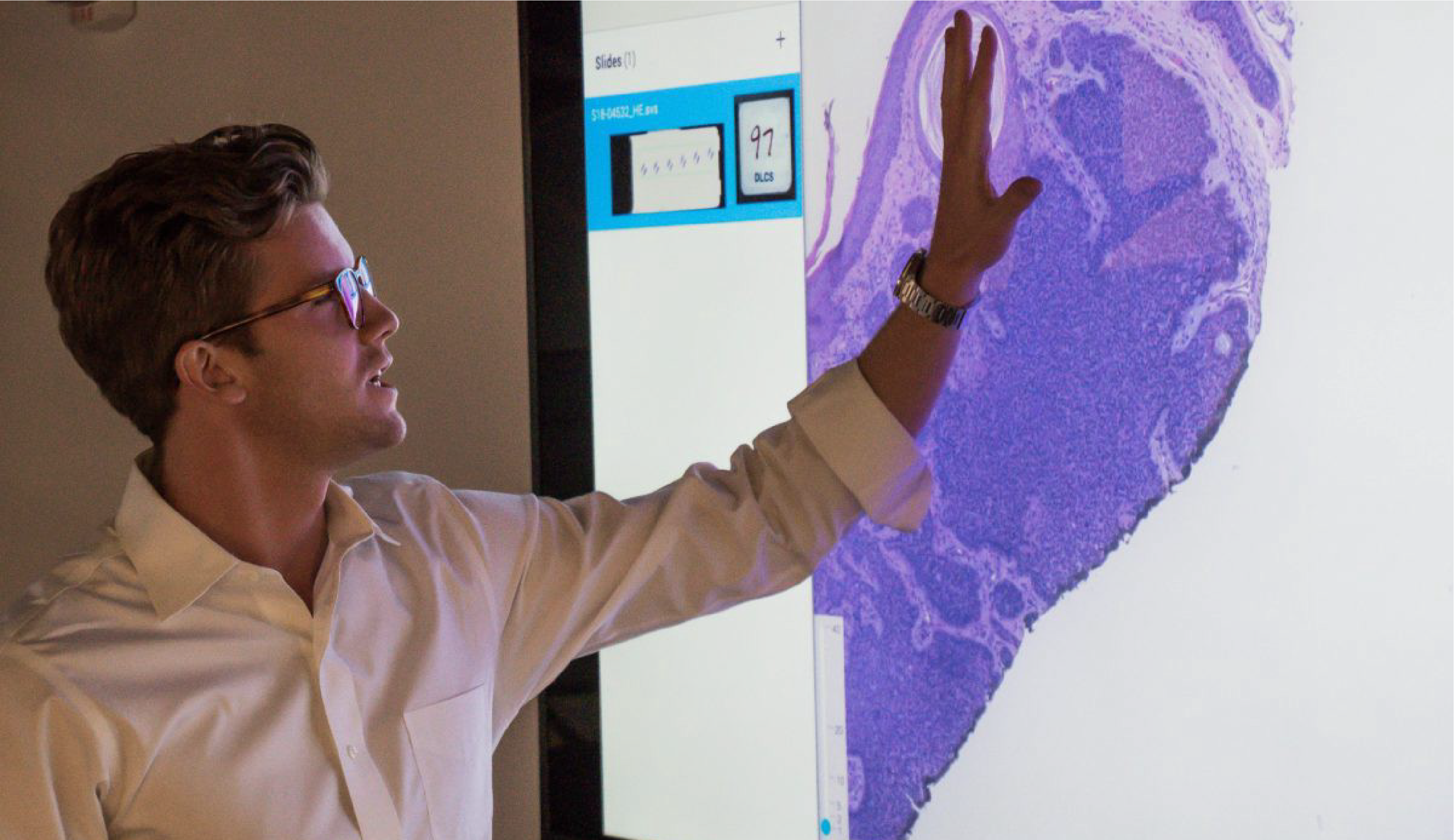10 Minutes with David West | Co-Founder & CEO, Proscia

Q. You were at Johns Hopkins University when you first conceived of Proscia. How did the idea come about?
Proscia is a company with humble beginnings and a big vision. I was working with scientists at Johns Hopkins using computer vision and machine learning to analyze tissue from prostate biopsies to predict cancer outcomes. I was fascinated by the idea that we could use computers to understand disease in a way that was very different from the current standard of care. It kind of smacked me across the head as one of those “10x better” technologies. But this technology was really only accessible to highly technical users in academic settings. To start, images were massive at 1GB each – so big that we were sending physical hard drives to collaborators to share data. Most pathologists couldn’t even access this data, let alone use the powerful AI algorithms. My co-founders and I started building software to solve the foundational problems and make this technology readily available to labs.
Q. Why is digital pathology important right now, both for research and diagnostics?
Pathologists and scientists are at the forefront of fighting humanity’s biggest challenges – from cancer to COVID – using tissue to understand disease, bring new therapies to market, and provide diagnostics that are critical to patient care. Yet they’re stuck working with tools from the 1800s, like microscopes, glass slides, and cardboard slide trays, while software has transformed every other industry and aspect of our lives. We think pathology deserves great software.
Q. How do you anticipate the industry and landscape changing over the next three to five years? How does AI factor in?
There are over 1B new glass slides created every year, and most of them end up on a shelf collecting dust and doing nothing for the world. Over the next 5 years, these will all be digital, with each slide containing over a billion pixels telling a story about a patient’s cancer or other disease. This is a tremendous data opportunity that will unlock insights and fuel the development of new diagnostic technologies and therapies. AI can help pathologists and scientists make sense of all this data, using patterns in tissue to understand disease on a quantitative level. Billions of dollars in value and tremendous patient impact will be created from this trend. We’re just in the first inning.
Q. How are you attracting and retaining talent?
Proscia is a mission-driven company. People come here because they want to change the world. Our customers include some of the most innovative organizations in life sciences and diagnostics, with the brightest minds in their fields. Any engineer can collect a paycheck writing for-loops to optimize some algorithm 0.0001%, or they can come change cancer research and diagnosis with us.
Q. What have you found to be most productive in working with your investors?
The relationship with our investors has expanded over Proscia’s growth journey. Emerald believed in us as a team early on, taking a bet on us founders and our vision for pathology. Keeping the investors up to date on company progress and transparently communicating wins and challenges is key. The investors can be helpful in addressing those challenges. Early on, when the focus is on finding product-market fit, investors can be a good sounding board. As we’ve grown, we’ve worked closely with investors to build relationships with partners and executive-level buyers.
Q. What’s on the horizon for Proscia?
Right now, we’re focused on delivering a world-class software platform to customers in diagnostic labs and pharma. As more and more customers trust us with their data and their workflows, I’m excited about how we can help our customers bring together siloed data from within and outside of their organizations to unlock new value. Machine learning and AI are transforming the space, and we want to help our customers harness the power of this technology.
Q. What is one of the best pieces of advice you received when you started as a founder?
A players attract A players, B players attract C players. Getting talent right, especially early on, is so important.
Q. Do you have any advice for new founders?
Do one thing really well. Focus is hard.
About Proscia
Proscia is a software company that is accelerating pathology’s digital transformation to change the way we understand diseases like cancer. Its Concentriq digital pathology platform and powerful AI applications are advancing the 150-year-old standard of research and diagnosis towards a data-driven discipline, unlocking new insights that accelerate discovery, improve patient outcomes, and fulfill the promise of precision care. Leading diagnostic laboratories and 14 of the top 20 pharmaceutical companies rely on Proscia’s software each day. For more information, visit proscia.com.
